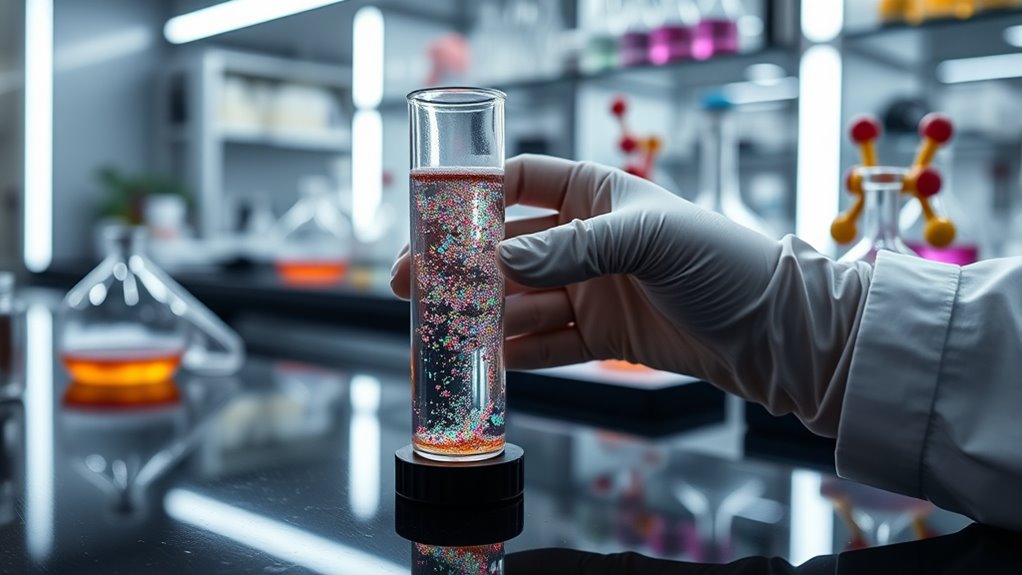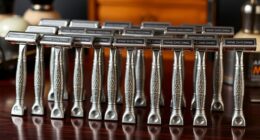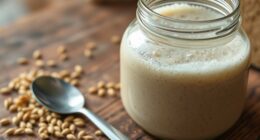To make your chemistry resume stand out, focus on highlighting your laboratory skills with specific techniques like chromatography, spectroscopy, and molecular synthesis. Detail your research experience by describing projects, your role, and measurable achievements. Organize your content clearly, prioritize technical expertise, and tailor skills to match job requirements. Including active research involvement and relevant coursework enhances your profile. Keep your presentation concise yet impactful—if you continue, you’ll uncover more tips to elevate your resume even further.
Key Takeaways
- Highlight specific laboratory techniques and equipment proficiency relevant to the job, such as chromatography and spectroscopy.
- Detail research projects with clear objectives, your role, and measurable outcomes or publications.
- Organize skills and research experience prominently early in the resume for quick impact.
- Use precise technical language and keywords from the job description to optimize ATS recognition.
- Quantify achievements and incorporate active research involvement to demonstrate practical expertise and engagement.

Crafting a standout chemistry resume can considerably boost your chances of landing the job you want, but it requires more than just listing your qualifications. You need to showcase your unique capabilities and illustrate how your skills directly align with the position. One of the most effective ways to do this is by highlighting your laboratory skills and research experience. These are core components that recruiters and hiring managers look for in chemistry professionals, so make sure they stand out clearly on your resume.
Start by creating a dedicated section for your laboratory skills. Be specific about the techniques and equipment you’re proficient with, such as chromatography, spectroscopy, titrations, or molecular synthesis. Instead of vague phrases like “experienced in lab work,” specify your expertise, for example, “proficient in gas chromatography and mass spectrometry.” This precision helps employers quickly assess your technical capabilities. When listing these skills, match them to the requirements mentioned in the job description. If the role emphasizes analytical techniques, ensure those skills are prominently featured.
Create a dedicated skills section, specifying techniques like chromatography, spectroscopy, and titrations to highlight your technical expertise.
Your research experience is equally critical. Detail the projects you’ve worked on, emphasizing your role and contributions. Instead of simply stating “worked on a research project,” specify what you did, the objectives, and the outcomes. For example, “Led a project on organic compound synthesis, resulting in a published paper in a peer-reviewed journal.” Quantify your achievements wherever possible, such as the number of experiments conducted, data analyzed, or improvements made. This illustrates your ability to apply your knowledge practically and your dedication to advancing scientific understanding. Incorporating innovative research methods can further demonstrate your adaptability and forward-thinking approach.
Don’t forget to include relevant coursework, internships, or collaborations that reinforce your research background. If you’ve participated in research conferences or presented findings, mention these as well. This shows your active engagement in the scientific community and your commitment to continuous learning.
Additionally, understanding Water Parks in various locations can provide a fun and relaxing way to unwind after intensive research or job applications, especially given their popularity in places like Owatonna, MN, Jacksonville, FL, Gatlinburg, TN, Denver, CO, and Wisconsin Dells. This balance can boost your overall well-being and productivity during your job search.
Lastly, organize your resume to highlight your laboratory skills and research experience early on, perhaps in the professional summary or skills sections. Use action verbs like “developed,” “analyzed,” “designed,” or “implemented” to convey your proactive role in projects. Keep your descriptions concise but impactful, focusing on what you achieved and the skills you gained.
Frequently Asked Questions
How Do I Tailor My Chemistry Resume for Specific Job Applications?
When tailoring your chemistry resume for a specific job, start by analyzing the job description to identify key laboratory techniques and industry-specific skills.
Highlight your relevant experience, emphasizing how you’ve applied these skills successfully.
Use keywords from the listing to pass applicant tracking systems, and focus on accomplishments that match the company’s needs.
This targeted approach shows employers you’re a perfect fit and increases your chances of landing an interview.
What Keywords Should I Include to Pass Applicant Tracking Systems?
You should include industry-specific keywords like “analytical chemistry,” “spectroscopy,” and “laboratory techniques” to guarantee your resume gets noticed.
Use ATS-friendly phrases such as “proficient in,” “experienced with,” and “skilled in” to match job descriptions.
Incorporate relevant certifications and software tools like “ChemDraw” or “LabVIEW” to increase your chances.
Tailoring these keywords to each application helps your resume pass applicant tracking systems and catch recruiters’ attention.
How Can I Effectively Showcase Research Experience on My Resume?
Did you know that 85% of hiring managers value research experience highly?
To showcase yours effectively, highlight specific lab techniques you’ve mastered and include publication highlights to demonstrate your contributions.
Use clear, concise bullet points to detail your role in experiments, emphasizing skills like spectroscopy or chromatography.
This approach helps paint a vivid picture of your expertise, making your research experience stand out and catch recruiters’ attention quickly.
What Common Mistakes Should I Avoid in a Chemistry Resume?
When creating your chemistry resume, avoid common mistakes like formatting errors that make it hard to read and excessive jargon that can confuse hiring managers.
Keep your layout clean and professional, and use clear language to explain your skills and experience.
Don’t overload your resume with technical terms; instead, focus on clarity and relevance.
This approach guarantees your resume stands out positively and effectively communicates your qualifications.
How Long Should a Chemistry Resume Ideally Be?
Think of your chemistry resume as a well-tailored suit—sharp and just the right fit. Ideally, keep it to one or two pages, focusing on quality over quantity.
Your resume length should be concise, highlighting key accomplishments and skills.
Use formatting tips like clear headings, bullet points, and consistent fonts to make it easy to scan.
Conclusion
Crafting a standout chemistry resume is like building a strong foundation for a house—you want it solid, clear, and inviting. Highlight your skills, experiences, and achievements with confidence, and tailor your content for each opportunity. Remember, your resume is your personal billboard—make it eye-catching and memorable. With a little effort, you’ll turn heads and open doors, just like a spark igniting a flame. Keep refining, and your perfect role will be within reach.









